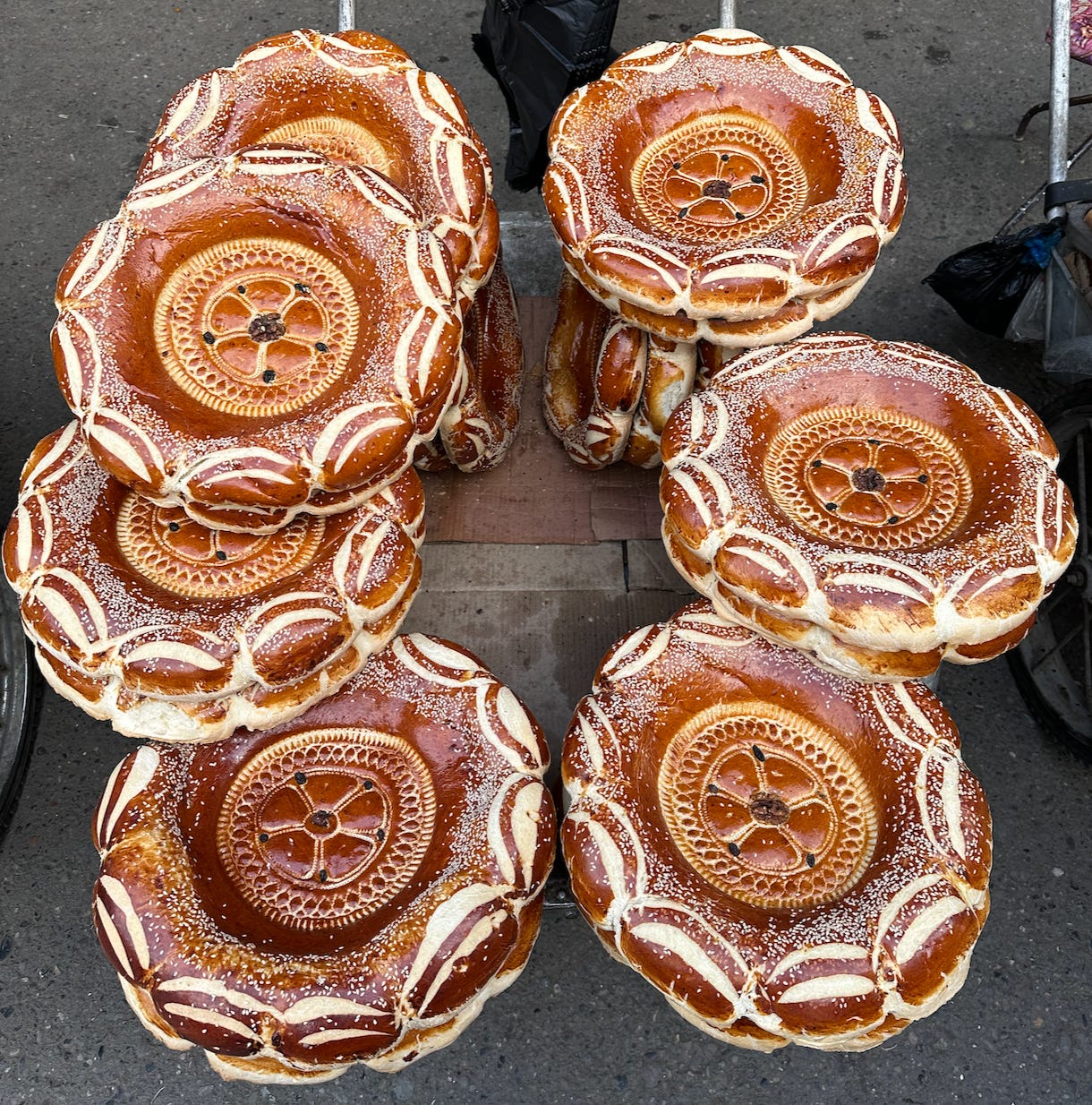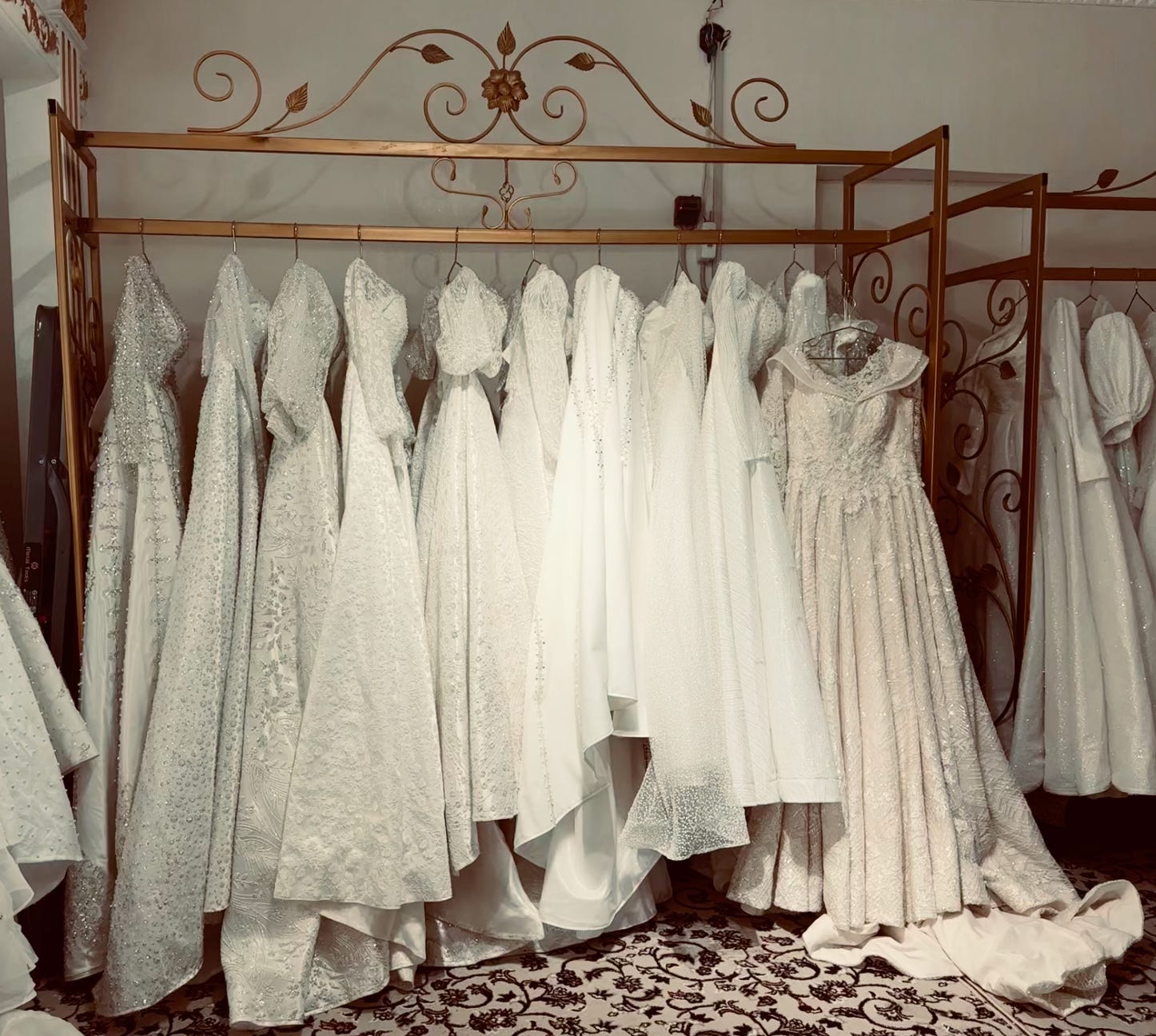What Motivates Wifely Obedience?
My big new theory is about “The Patrilocal Trap”. In this post, I analyse the drivers of cultural persistence in Uzbekistan.
Girls are socialised to please their in-laws.
Obedience is widely accepted
Divorce is strongly discouraged
No one is trying to remove the stigma
Paid work doesn’t necessarily increase women’s autonomy
Men may be shamed for conjugal love
This draws on my qualitative research. Names have been changed for anonymity.
Girls are socialised to please
Central Asians traditionally arranged marriages to consolidate close-knit networks of social cooperation. Uzbeks and Tajiks were patrilocal endogamous, Kazaks and Kyrgz were patrilocal exogamous.
Socialisation instils loyalty. Uzbek girls are perpetually reminded to please their mothers-in-law. Relatives offer well-meaning advice on how to excel:
“Clean properly to please your mother in law”,
“Don’t spill the tea, your mother-in-law won’t like you, or you’ll be divorced [a disaster]”
“Don’t do that, people will talk badly about your parents, “they raised such a girl”.
“Clean well and we’ll be able to attract a good husband for you” - one teacher joked to a 6th grader.
Defying parents and in-laws is widely seen as disrespectful. Across Fergana Valley, young people reiterated that questioning parents is ‘rude’.
“My parents want me to marry this doctor. I’ve never met him. He’s an extended relative… I can’t argue with my mother, it’s not respectful” - Uzbek student.
Obedience is widely accepted
Many Uzbek women feel a genuine sense of loyalty to their in-laws. Within a minute of meeting, an Uzbek woman may proudly declare that she is a ‘kelin’ (daughter-in-law). By living under their authority, she gains a social stamp of approval. When she says ‘my family’, an Uzbek wife is usually referring to her in-laws.
Curious to understand generational change, I interviewed three generations of women in Altinkul (a small town in Fergana Valley). This included four classrooms of 17 year olds, 40 year old teachers, housewives, and elderly grandmothers.
When I asked how their lives differ from their mothers, women usually emphasised vacuum cleaners, washing machines, cheap bread, and total fertility. Technologies have drastically reduced physical drudgery.
Culture, however, seems remarkably persistent. Everyone reiterated that kelins should obey. The 40 year olds straight-forwardly told me that their husbands may decide their fertility, prohibit certain clothing, and forbid socialising. I also gave several hypothetical scenarios: “Suppose your mother in law wants you to cook for a big family gathering. Yet you have a job. What should you do?” One suggested she would ask her female friends for help. No one expressed any critique or resistance.
After 16 years of marriage and 3 children, Dilrabo’s husband finally permits her to have lunch with female relatives. He still refuses to let her work. No one sees this as problematic; he provides financially. When housewives go out to modern cafes for tea and cake, they usually advise each other to ‘be patient’ (sabri bol). Young girls hear precisely the same: ‘be patient’.
“Usually, in marriage, you are restricted for the first 15 years, then you have freedom. So they must just be patient..” - 41 year old female teacher
When a teacher from Kokand moved in with her in-laws, she felt duty-bound to obey:
You have to obey what has already been set. You are nothing until you have children. My mother-in-law said that once you finish the housework, you can finish, but the work never finishes… I wanted money so I could buy things I wanted, I wanted financial freedom.
Divorce is strongly discouraged
Even if women are privately critical, they may still be reluctant to divorce.
Women are unlikely to earn or inherit enough for economic independence.
Marital property may be registered under another name, making it ineligible for division upon separation. Divorcees in Samarkand are rarely awarded property.
Divorce is seen as humiliating, shaming the woman’s family. Parents instil fear, telling girls to please their in-laws so that they are not divorced.
The Uzbek government is encouraging courts and mahallas (community leaders) to ‘prevent family divorces’. President Mirziyoyev has publicly criticised divorce, and lambasted failing mahallas, saying they can “vacate their positions if they cannot pull the cart.” In 2020-21, mahalla activists apparently reconciled 50,000 families on the verge of divorce.
No one is trying to remove the stigma
Monogamous marriage has no detractors.
Marriage is imperative for respectability.
Single women also threaten the entire social structure, since they might destabilise existing unions. Married women want them married as soon as possible.
Seldom seeing successful single mothers, divorce is widely perceived as harmful. Children of divorcees were frequently referred to as ‘orphans’ (even if their fathers are alive).
Thus, while women could improve their marriages if they could credibly threaten exit, no one is trying to normalise divorce.
Divorce remains economically ruinous, culturally condemned, and repressed by government. The impossibility of exit gives husbands the upper-hand, and suppresses women’s labour market commitment. Since marriage provides a basic safety net, this suppresses the motivation to become economically independent.
Paid work doesn’t necessarily increase women’s autonomy
Earnings increase women’s financial autonomy, but do not necessarily enhance their control over their time, mobility, socialising, clothing or even fertility. Money doesn’t buy ‘bargaining power’ because negotiation is often seen as disrespectful.
When I visited conservative homes, young women typically greeted, served the food, then disappeared. Even a 40 year old doctor may act like a maid - as I observed in one village. She is a qualified professional, doing extremely valuable work, literally saving lives. Yet she nevertheless lacked the status to sit with her mother-in-law’s guests.
In Andijan, I chatted to a jovial class of trainee teachers. They were confident, charismatic and perfectly fluent in English. Intellectually, they had many options. I posed my hypothetical scenarios. All reiterated obedience. Their mother-in-law comes first. They owe her respect as their husband’s mother, and if they treat her well, their husband will also be nicer.
In Samarkand, I interviewed a superbly clever, entrepreneurial waitress (simultaneously studying English). Her parents are liberal, her mother is a working professional. She persuaded them to let her study in China, where she also worked in a kindergarten. Our conversation was private, no one else was there to listen or judge. There was no obvious motive for her to feign conservatism.
She wants to continuing working; she definitely does not to “just sit at home”. But she is not totally sure what will happen, it’s up to her husband. Following their recent engagement, her partner became much more authoritative. She and her mother also worry about her mother-in-law, a “typical Uzbek woman”.
“When he is happy he says I can work, when he is sad, he says I must stay home. I must obey. My destiny belongs to my husband, it’s in our religion”.
Even in Tashkent, professional women may still be forbidden to socialise with male colleagues or advance their careers. All this is widely accepted.
A Tashkent university lecturer contacted me a week after our initial conversation, keen to vent frustrations, but still self-censoring. I share our whole conversation, as it articulates widespread tensions.
Marifat: “My mother-in-law is coming from umrah, the religious visit to Medina, and we are supposed to greet a lot of guests, to meet them welcome at home. Now I suddenly find out that my husbands’ friends are coming.
Believe me, I *must* make them welcome at home. And I must forget about myself. I have my children’s homework, study with them, I have my work from university, I have to prepare tests, quizzes and so on, but I can’t dedicate myself to my work because tomorrow is the day of the guests..
Well, I’m not complaining to you, it’s not a complaint. It’s something I dislike personally, I don’t like when someone tries to manage my time, but because it’s my mother-in-law who’s coming it’s okay. It’s our traditions, it’s good, lots of people like that we’re so hospitable, but it’s not always about your choice..
We are expected to behave that way and I can’t go against it because the society, my sister-in-law, they expect me to make guests welcome, to welcome all the relatives. This is what’s going to happen to me tomorrow
Alice: Can you ask your husband for help?
Marifat: if you are a newly married couple and live with your husband's parents, you are supposed to obey your mother-in-law. And males' help is not welcome in the kitchen (in my family my mother in law will get angry if she sees her son helping me peel potato. On the other hand, it is okay if he goes shopping.. Neither will he help my children with their homew orks.. But it varies from family to family
Alice: Five fingers are not the same.
Marifat: Believe me, I am 41 years old, and still cant make my own decisions... I need my mother-in-law’s approval, then my husband's…
Alice: Have you said to anyone that it is a struggle?
Marifat: I can, but if I do, this may sound as a sign of disrespect towards my mother-in-law.
Alice: Yes. What would happen then?Marifat: I tried, and the result was not good for me.
Alice: What would happen if you said to your husband, “This number of guests is overwhelming. Can you please not invite so many friends? I am not a professional restaurant. I’m a lecturer and a mother”.
Marifat: [Laughs] He tells me my number one mission is being mother, being wife, not a university professor definitely.. Actually, they don’t invite, we know that number will come anyway..
Alice: May I ask, what do you reply when your husband tells you that your number one mission is kelin?
Marifat: He starts with our religion... Though I believe that in İslam there's nothing like that. Our people confuse religion with traditions, and visa versa
Alice: He thinks Sura An-Nisa justifies this? Does he cite a specific verse?
Marifat: No, he doesn't. There's a hadith - women should obey and get the consent of her husband in order to get in paradise
Alice: So he believes he has religious authorisation to tell you to serve food.. etc
Marifat: I mean they use religion partially for their own needs and when it comes to women's rights they ignore. İslam is perfect, women should not be suppressed this way… He believes I should obey his mother…
I don't discuss, otherwise if I start debating, he may end up telling me to stay at home and never go to work (together with my mother-in-law)..
I have already hired a housekeeper who would come once a week to clean the house ( to compensate my absence at home and to make my mother-in-law not to feel she is a housekeeper)
Alice: Do you think if you start questioning the volume of housework, they could make you quit your job?
Marifat: This can't even be questioned.
Alice: Do you feel guilty for working?
Marifat: Yes, I feel guilty for working. Yes... I feel guilty sometimes. But there is more issue between me and my mother-in-law for that.. My mother-in-law in law doesn't want me to grow professionally and she has some worries over that. She believes my career growth will change my personality.
Alice: So it is your mother in law, not your husband, that worries about you becoming too autonomous?
Marifat: Yes. She has already accused me several times for being disrespectful since I started my job [three years ago]... So she believes this has changed me a lot. But it's not my personality that changed, In fact, I have less time to dedicate myself to her and other relatives who come over every other week...
Alice: They resent the absence of a free maid?
Marifat: Yes
Alice: WHO WOULDN'T! I'D LOVE A FREE MAID! [laughs]. In fact, when I talk to older women, they are often so excited about getting a kelin! It's such a treat and source of excitement! After a lifetime of struggle, at last you have someone to do jobs for you. It's like getting a new car! I bet if you asked a 50 year old woman, do you want a new car or a kelin, she'd say a kelin.
Marifat: You know Uzbek women better than me.. you speak as though you have lived among us for so long.
Alice: Older women have struggled so much.. And when they were kelins, they had even more kids, even less technology, so it was really hard for them. Now they want someone they can boss about, do nice things for them.
Marifat: Yes... This is their trauma from the past...
Alice: I WISH I COULD FLY TO TASHKENT AND HELP YOU! I WOULD BE YOUR KELIN! A VOLUNTARY KELIN!!!
Marifat: I would be told off by my mother-in-law for telling my problems to other people too. So kelins are watched carefully by their mother-in-laws.
Marifat clearly feels that restrictions are unfair and unIslamic. But resistance is chided as disrespectful, and she considers it impossible. The best she can do is use her salary to pay for a replacement maid.
Men may be shamed for conjugal love
Men may maintain patriarchy but mocking male peers who step out of line and show too much support for independent women. Romance may even be ridiculed as it indicates men’s support for their wives.
Two Uzbek migrants observed how fraternal policing motivated public conformity:
Samira: Men don’t say ‘I love you’. My husband is progressive, we hold hands, but when we met his friends in [America], I tried to hold his hand and he let go. It was like pouring cold water on me! This is preference falsification! Inherently, he enjoys it. But in front of another Uzbek, he won’t.
Gulasal: As a man, you need to be tough and assertive. If you show love in front of others it’s weak.
Samira: My husband can show me intimacy alone.
Gulasal: Uzbek men never go down on women. It’s a weakness. Even if they do it at home, they’ll never say it to their friends. It’s a weakness.
Samira: If it’s just me and him, my husband does housework. I just tell him to do stuff. It’s so intimate and warm, we’re university friends. But in front of his mother or friends, it’s totally different.
Conclusion
Girls marry into a man’s family, under their authority. Divorce remains socially humiliating, shaming her family. To preserve their reputations and social networks, many families socialise their daughters to obey. Even if beaten, she is encouraged to ‘be patient’. Very few can credibly threaten to leave.
Separation is economically risky. Patrilineal inheritance bequeaths wealth to sons. While Islam gives brides the right to ask for a mahr (marital payment), she loses it if she initiates divorce. She is thus caught in “The Patrilocal Trap”.
Modern technology has reduced the physical exertion of housework, but culture remains remarkably persistent. Wifely obedience is not new. Under the USSR, it was justified as ‘custom’. It is a consequence of patrilocality, where girls are socialised to please their in-laws, for fear of humiliating divorce.
Religious justifications are often given for widely obedience - even by those who cannot read Arabic or cite relevant verses. Interviewed women in Altinkul said that they will only enter paradise if they obey. In this sense, contemporary interpretations of scripture seem to stall cultural change.














This is an odd thought but in modern society when we discuss things like "the patriarchy" it's fairly common for people to argue that it doesn't exist--i.e. you can't point to any one place where "the patriarchs" are gathered, consolidating power for their nefarious ends.
But it seems pretty obvious (especially after reading this piece) that "the patriarchy" isn't so much an organization as it is a mode of being--one that is in effect in traditional societies, that was strongly in effect in America about a hundred and fifty years ago, and whose vestiges still remain in modern attitudes.
Why is the first duty to the MIL? Is the patriarchy upheld by mothers?